英语语法-限定词
限定词的种类
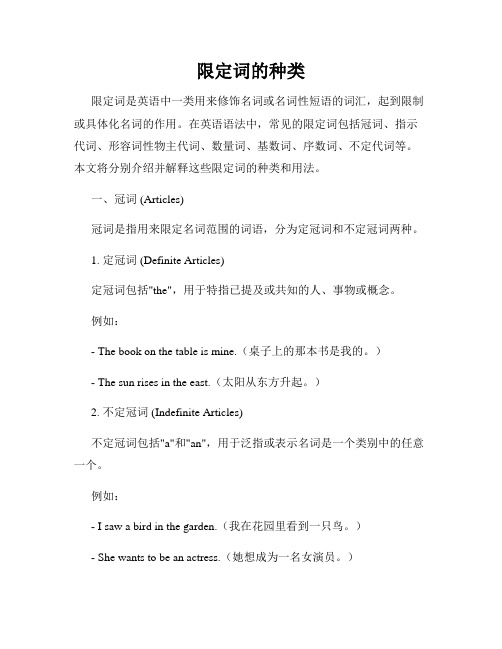
限定词的种类限定词是英语中一类用来修饰名词或名词性短语的词汇,起到限制或具体化名词的作用。
在英语语法中,常见的限定词包括冠词、指示代词、形容词性物主代词、数量词、基数词、序数词、不定代词等。
本文将分别介绍并解释这些限定词的种类和用法。
一、冠词 (Articles)冠词是指用来限定名词范围的词语,分为定冠词和不定冠词两种。
1. 定冠词 (Definite Articles)定冠词包括"the",用于特指已提及或共知的人、事物或概念。
例如:- The book on the table is mine.(桌子上的那本书是我的。
)- The sun rises in the east.(太阳从东方升起。
)2. 不定冠词 (Indefinite Articles)不定冠词包括"a"和"an",用于泛指或表示名词是一个类别中的任意一个。
例如:- I saw a bird in the garden.(我在花园里看到一只鸟。
)- She wants to be an actress.(她想成为一名女演员。
)二、指示代词 (Demonstrative Pronouns)指示代词指代特定的人、事物或位置,并且根据离说话人的距离分为远指和近指两种。
1. 远指代词远指代词包括"that"和"those",用于指代离说话人较远的事物或人们。
例如:- That is a beautiful sunset.(那是一个美丽的日落。
)- Look at those flowers over there.(看看那边的花。
)2. 近指代词近指代词包括"this"和"these",用于指代离说话人较近的事物或人们。
例如:- This is my new car.(这是我的新车。
)- These are my friends.(这些是我的朋友。
英语语法---限定词

限定词(determiner)限定词的先后顺序: 前位---中位---后位(一个名词中心词之前不可并用两个前位限定词或两个中位限定词)冠词的表意功能(1)The ten of them have passed the final examination.Ten of them have passed the final examination.Ten of the (these/his) students have passed the final examination.(2)They asked to stop counting presidential votes for a second time.(3)Every boy and every girl___(have) his merits.Every young man, young lady,and child ___(be) requested to take part.Many a person___(be) going to the take the test.(4)Other or anotherCalifornia covers a large area than __________state except Alaska and Texas.Out of the three foreign guests, one is from Frankfurt, ______two are from Vienna.. Don'.los.heart.Hav.___try.There's room for _________people in the back of the bus.(5). ing.We'l.hav.____.five-da.holiday.(6)冠词的用法Who is ___captain of your team?. Mr.Reaga.wa.electe.___Presiden.o.th.Unite.State.i.1980.Charles Dickens,__author of David Copperfield, was a distinguished English novelist.As ____physician, he does not deserve much praise.He was covered with snow from ___head to __foot.The relation between ___teacher and ___student is excellent.This room serves the triple purpose of ___study, ___bedroom and ____sitting room. The old man was sitting in a chair, ___pipe in ___hand.He sat at ___ table, ___coat off, ___head down, and __pen in ___hand.What kind of ___man is he?What sort of ___book do you want?The work is ____pleasure to me.She has developed ___love for labour.Physics is ____ science.He spoke with _____ enthusiasm which inspired us all.Do you like ___ music of ___film?Phonetics is ____science of speech sounds。
专四语法第4节-限定词
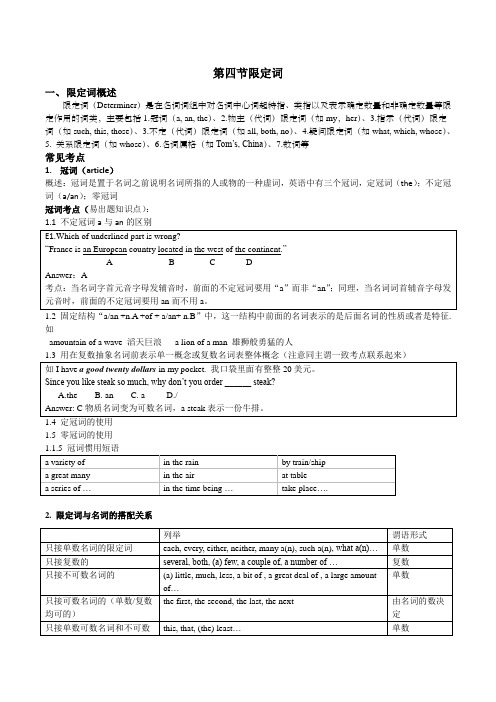
第四节限定词一、限定词概述限定词(Determiner)是在名词词组中对名词中心词起特指、类指以及表示确定数量和非确定数量等限定作用的词类,主要包括1.冠词(a, an, the)、2.物主(代词)限定词(如my,her)、3.指示(代词)限定词(如such, this, those)、3.不定(代词)限定词(如all, both, no)、4.疑问限定词(如what, which, whose)、5. 关系限定词(如whose)、6.名词属格(如Tom’s, China)、7.数词等常见考点1.冠词(article)概述:冠词是置于名词之前说明名词所指的人或物的一种虚词,英语中有三个冠词,定冠词(the);不定冠词(a/an);零冠词冠词考点(易出题知识点):1.1 不定冠词a与an的区别1.2 固定结构“a/an +n.A +of + a/an+ n.B”中,这一结构中前面的名词表示的是后面名词的性质或者是特征. 如amountain of a wave 滔天巨浪 a lion of a man 雄狮般勇猛的人1.3 用在复数抽象名词前表示单一概念或复数名词表整体概念(注意同主谓一致考点联系起来)如I have a good twenty dollars in my pocket. 我口袋里面有整整20美元。
Since you like steak so much, why don’t you order ______ steak?A.theB. anC. aD./Answer: C物质名词变为可数名词,a steak表示一份牛排。
1.4 定冠词的使用1.5 零冠词的使用2. 限定词与名词的搭配关系3.限定词与限定的之间的搭配关系3.2 多个限定词相遇时,其位置使用规则*基本规则:“前位+中位+后位”both the brothers all his two daughters (前+中+后)all other students (前+后) those last few minutes (中+后+后)*such做限定词有特殊规则:such+不定冠词(such位于前)当such 和其他的限定词(some, any, no, fall, few, another, other, many, one, two等)搭配时,such是后位限定词,如I’ve never seen such a dog.All such problems should be considered.4. 特殊限定词的使用4.1some 和any 的用法1)some, any与复数名词和不可数名词搭配,表“一些”some 和单数名词搭配表“某一”any与单数名词搭配表“任一”2)some一般用于肯定句中,也可以用在表示希望对方给出肯定回答的疑问句中any 多用语疑问,否定句,条件句,if/whether引导的从句3)固定搭配some day 来日some day or other 迟早not…any longer/more 不再at any rate/in any case 无论如何4.2no 的用法1)no可以修饰单数可数名词,复数名词和不可数名词,其意义相当于“not a “ “not any”, 所以no不能和a(n), any 连用。
英语语法--限定词,冠词

2) 三类限定词的搭配关系 如果一个名词词组带有上述 三类限定词,其搭配关系总是按照“前位--中位- -后位”的顺序排列。 例如: all前the中four后teachers. all前your中three后books. all前these中last后few后days. 如果只有上述两类限定词, 其搭配关系仍按上述顺序。例如: half前his中lecture. those中last后few后months. several后hundred后guests. all 前other后students. such前a中misfortune. some中such后 alloy.
6〕能与单数名词和不可数名词搭配的限定词 有些限定词 如this, that, (the) least等能与单数名词和不可数名词搭配。 例如: (the) least sign (of prejudice), this / that job, (the) least knowledge, this / that work. 7〕能与复数名词和不可数名词搭配的限定词 还有些限定 词如a lot of, lots of, enough, more, most, such, other等可与复 数名词和不可数名词搭配。例如: a lot of books, a lot of money, lots of chickens, lots of food, plenty of chairs, plenty of water, enough copies, enough coal, more articles, more time, most people, most work, such men, such bread, other men, other bread. 不定量限定词less原先只与不可数名词搭配,但在现代英 语中,less既可与不可数名词也可与复数名词搭配。例如: less money, less mistakes.
语法5(限定词1)
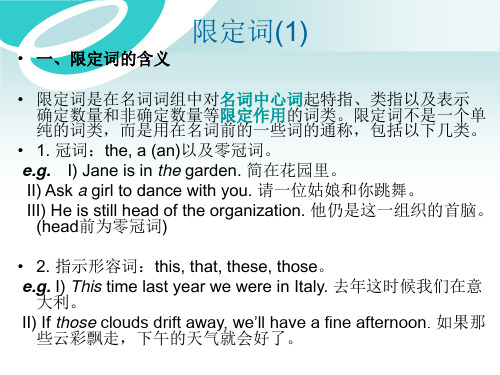
• 2. each, every的用法 • each用作限定词,后面接单数(可数)名词,但当出现另外一 个限定词时(如冠词,物主代词,指示代词),要用each of, 后面接复数名词,each of也可以用在人称代词前。 • e.g. I) Each day is better than the one before. • II) I’ve invited each of my colleagues in turn. 我一一邀 请了我的每一位同事。 • III) She phoned each of us. 她给我们每人都打了电话。
• each和every都可以表示全体中的“每个”,但它们的意思 并不完全一样,区别在于:
• 1) each可以用来指两个或两个以上的人或物,而every却总是指三个或 三个以上的人或物。 • e.g. I) Every student in the class took part in the performance. 班里 每个同学都参加了演出。 • II) Each side of the street was crowded with people. 街道的两边 都挤满了人。 • 2) every和each的区别还在于every指许多人或物中的“每一个”,侧 重于总体概念,意思类似于all。而each则指许多人或物中的“各个”, 侧重于个别。 • e.g. I) Every pupil failed the test. = All the pupils failed the test. 所有 小学生都没有通过考试。 • II) We want every student to succeed. = We want all the students to succeed. 我们想要每个学生都成功。 • III) Each child will find his or her own personal road to success. 每个孩子都将会找到他或她自己的成功之路。 • IV) The president shook hands with each player in turn after the game. 赛后,总统和每一位选手都握了手。
英语语法之限定词
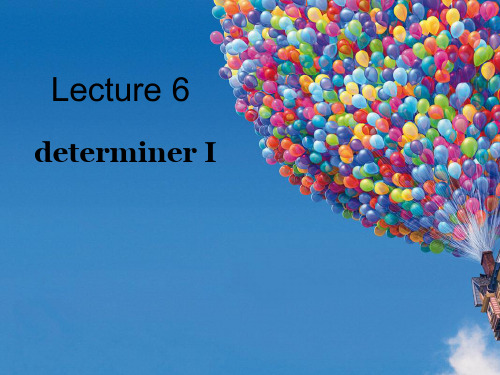
搭配关系
•与三类名词 •限定词之间 •若干限定词用法比较
与三类名词的搭配关系(单数名词
复数名词 不可数名词)
1.与三类名词都可以搭配的
• the (book,books,money) • my / your / john’s ------ whose • (the) other •Some ( book , books , money) •Any ( book , books , money)
②They questioned the(前) both(中) last(后) two(后) boys(名).
⑴ 前位限定词
• 种类:主要是用来说明名词的数量 ①表示倍数关系
half my salary, twice my salary, double my salary,three times my salary;
Like all such
stories..
Such optimism has
become…
限定词之间的搭配
前位限定词(Pre-determiner) 中位限定词(Central Determiner) 后位限定词(Post-determiner)
① I met all(前) my(中) many(后) friends(名).
Specific reference 特指 Generic reference 类指 Definite quantity 表示确定数量
Indefinite quantity 表示非确定数量
• 英语的限定词包括: • 定冠词(DEFINTITE ARTICLE〕,不定冠词 (INDEFINITE ARTICLE〕,零冠词(ZERO ARTICLE 〕 • 物主限定词(POSSESSIVE DETERMINER〕,my, your, his, her, our, your, their, one's, its. • 名词属格(GENITIVE NOUN〕,John's, my friend's. • 指示限定词(DEMONSTRATIVE DETERMINER〕, this, that, these, those, such. • 关系限定词(RELATIVE DETERRMINER〕,whose, which. • 疑问限定词(INTERROGATIVE DETERMINER〕, what, which, whose.
限定词

限定词1.什么叫限定词限定词位于名词之前,对名词起特指、泛指或表示数量等限定作用的一类词,如:特指:the book, my book, this book 等(说话或听话人都知道指点哪一个事物。
)泛指:a book, some books, 等(泛指是指点任何一个(些)事物)数量:two books, many books, much sugar 等在句子中担任主语、宾语、补足语等的名词词组,一般都由“限定词(+形容词)+名词(+后置修饰语)”构成。
但是限定词有不同类型,名词有不同种类,限定词与名词不能随便搭配,因此哪些限定词可以与哪些名词并用就必须加以注意。
总的来说,限定词一般不与专有名词搭配,用于普通名词时要根据名词的数和类别来决定。
我们把名词划分为以下三类:单数可数名词:a book that book 等复数可数名词:these books such books 等不可数名词:some tea little water 等2、哪些是限定词兹将限定词列表如下,表中指明各个限定词与三类名词搭配的情况:限定词单数可数复数可数不可数a(n) book -- --a (little)bit of -- -- breada great amount of -- -- breada great (good) deal of -- -- breada great(good, large, small)number of -- books -- all day books breada lot of -- books breadanother book -- --any book books breadboth -- books --double the price the quantities the strengtheach book -- --either book -- --enough -- books breadevery book -- --(a) few -- books --fewer, (the) fewest -- books --the first, the second, etc prize prizes --half an hour the men the bread the last book books --(the ) least thing -- bread less -- -- bread (a) little -- -- bread lots of -- books bread many a book books -- more -- books bread most -- books bread much -- -- bread my, your, his, etc book books bread Tom’s, the old man’s, etc book books bread neither book -- --the next book books --no book books bread one book -- --one-third, two-fifths, etc (of)the book (of) the books the time other student students breadthe other book books -- plenty of -- books bread several -- books --some (某一)book books bread such book books bread that book books bread the book books bread these -- books --this book -- bread those -- books -- twice, three times, etc the figure the quantities his strength two, three, etc -- books --what(ever) book books bread which(ever) book books bread whose book books bread zero(不用冠词或其它限定词) man men bread [注] 表内“—”表示有关限定词不能与该类名词搭配。
英语语法之 限定词(一)
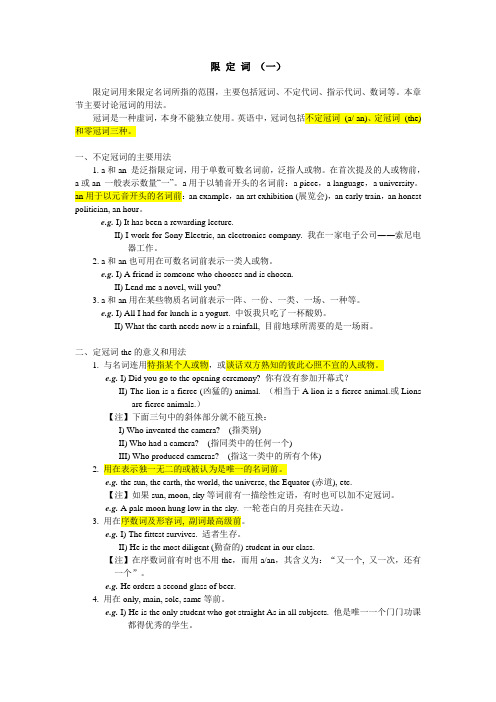
限定词(一)限定词用来限定名词所指的范围,主要包括冠词、不定代词、指示代词、数词等。
本章节主要讨论冠词的用法。
冠词是一种虚词,本身不能独立使用。
英语中,冠词包括不定冠词(a/ an)、定冠词(the) 和零冠词三种。
一、不定冠词的主要用法1. a和an 是泛指限定词,用于单数可数名词前,泛指人或物。
在首次提及的人或物前,a或an 一般表示数量“一”。
a用于以辅音开头的名词前:a piece,a language,a university。
an用于以元音开头的名词前:an example,an art exhibition (展览会),an early train,an honest politician, an hour。
e.g. I) It has been a rewarding lecture.II) I work for Sony Electric, an electronics company. 我在一家电子公司――索尼电器工作。
2. a和an也可用在可数名词前表示一类人或物。
e.g. I) A friend is someone who chooses and is chosen.II) Lend me a novel, will you?3. a和an用在某些物质名词前表示一阵、一份、一类、一场、一种等。
e.g. I) All I had for lunch is a yogurt. 中饭我只吃了一杯酸奶。
II) What the earth needs now is a rainfall, 目前地球所需要的是一场雨。
二、定冠词the的意义和用法1. 与名词连用特指某个人或物,或谈话双方熟知的彼此心照不宣的人或物。
e.g. I) Did you go to the opening ceremony? 你有没有参加开幕式?II) The lion is a fierce (凶猛的) animal. (相当于A lion is a fierce animal.或Lions are fierce animals.)【注】下面三句中的斜体部分就不能互换:I) Who invented the camera? (指类别)II) Who had a camera? (指同类中的任何一个)III) Who produced cameras? (指这一类中的所有个体)2. 用在表示独一无二的或被认为是唯一的名词前。
- 1、下载文档前请自行甄别文档内容的完整性,平台不提供额外的编辑、内容补充、找答案等附加服务。
- 2、"仅部分预览"的文档,不可在线预览部分如存在完整性等问题,可反馈申请退款(可完整预览的文档不适用该条件!)。
- 3、如文档侵犯您的权益,请联系客服反馈,我们会尽快为您处理(人工客服工作时间:9:00-18:30)。
限定词
数量限定词
只与可数名词连用
只接单数 one each every
只接复数 two(three) both a couple of a few several many a number of
只与不可数名词连用
a little little much a great deal of a large amount of
与可数名词复数或不可数名词连用均可
not any some a lot of lots of plenty of most all
数量词与of连用
all/most/some/any of+特指限定词+复数可数或不可数名词
most books
most of books 不正确
most of my/these/the/john’s books
many/a few/few/several/both/two/three of +特指限定词+ 复数可数名词
many students
many of students 不正确
many of these students
much/a little/little of +特指限定词+ 不可数名词
much water
much of water 不正确
much of the water
其他数量词 a lot of , lots of , a couple of , plenty of , a number of , a great deal of 直接+名词
all和both特殊用法
all/both my students 可以不加of,其他much/many数量限定词不可这么用
all students
all of my students
all of students 不正确
数量词a few, few(只接可数), a little, little(只接不可数)
a little,a few为肯定之意,等同于some,有一些
His theory is rather difficult; few people understand it.=almost no people understand it.
I have little interest in English, so I am very poor at it.
little,few为否定之意,等同于几乎没有
His theory is rather difficult, but a few people understand it.
I have a little interest in English, so I like learning it.
only a little,only a few very few,very little
some and any
陈述句:some 一般用肯定,any一般用否定,表示”一些“。
可与可数或不可数名词连用。
I need some medicine to cure my cough.
I don’t have any friends here.
疑问句:多用any;在期待对方回答”是“的时候,要用some
Have you got any medicine to cure your cough?
Would you like to give me some advice? Can I have some more wine?
any可以表示”任何一个,无论哪一个“,用于任何句型。
You can catch any bus. They all go to the railway station.
冠词
● a 辅音因素开头的名词前, an 元音因素开头的名词前
●单数可数名词:不能单独使用,必须用冠词或其他限定词
●复数可数名词 or 不可数名词:
(1)不能同冠词连用
(2)复数名词 or 不可数名词
泛指:不用the
Life is hard sometimes
特指:用the
The writer is writing a book about the life of blacks in America.
I love music, poetry and art.
I don’t like the film, but I like the music(of the film)
表示特指的时候,一般会带有后置定语
●第一次提到单数可数名词前用不定冠词a/an,再次出现要用定冠词the
●谈到对话双方都知道的事物要用the(比如自己房间里的东西)
can you turn off the light, please?
●表示世界上独一无二的事物用the
the earth, the sky, the equator, the moon, the world, the universe
●做形容词的only、最高级、序数词修饰的名词前+the
the only/best way to cope with the problem.
this is the first time I’ve come to Beijing.
●乐器、乐团+the(运动不+the)[play football/chess/tennis]
the Beatles
the Philaadelphia Orchestra
play/learn the guitar learn the piano
●独一无二的身份不+the
Henry was elected chairman of the committee
For the first time I am king of myself
●限定词彼此互斥,不能同时出现在名词前面
(1)冠词:the an a
(2)物主形容词: my your his her our their
(3)指示形容词: this that these those
(4)名词属格:Tom’s John’s
●特殊名词前省略the
(1)nature : in nature (2)society: in society (3)space: in space
(4)man在泛指整个人类时,不加冠词
(5)history在泛指整个历史时,不加冠词
(6)三餐前不+冠词:have something for breakfast/lunch/supper/dinner
●交通工具
若用介词on:+冠词the(on foot 步行不加the)on the train/plane/boat
若不用介词on,如用by时,不加the: by bicycle/boat/bus/car/plane/train/metro
●其他固定介词搭配
face to face , arm in arm , hand in hand , shoulder to shoulder , side by side
inch by inch , day after day , dentist after dentist
●school/the school
bed, church, court, hospital, prison, school/college/unversity, sea, work, office 当人们去这些地方做在这些地方应该做的事情时,不加冠词,表示抽象概念
当要去这些地方不是要做特定的事,而是由于其他原因,要用the
his mother is in hospital and he has been in the hospital to take care of her.
Bill Blinton came into office in 1992./Bill Clinton came into the office and saw sth. to church(to pray)
to hospital(as patients)
to/at sea(出海/在海上)
to/at/from(去上班/在上班/下班)
go to sea(as sailors) go to the sea(go to the seaside)
be at sea(as passengers or crew) be at the sea(be at the seaside)
by sea(by ship)
by the sea(by the seaside)
be in office(在任职) be in the office(在办公室里)
be out of office(离职) be out of the office(离开办公室)
●泛指的四种表达
1.不带the的不可数名词
I like music
2.不带the的复数可数名词
bananas are yellow I am afraid of dogs
3.the+单数可数名词(也可表示特指)
the whale is the largest mammal on earth
the whale is dead
4.a/an+单数可数名词(也可以表示一个)
I ate a banana this morning
A banana is yellow。
